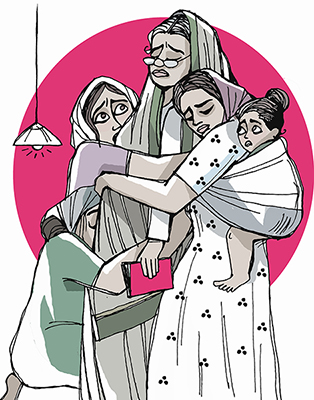In his service - II
Berjis Desai
On his way to perform a navjote, a fifth generation mobed dies of dehydration in a forest; just like his father who perished young in eerily identical circumstances. Successive personal tragedies did not deter this impoverished family from serving the holy fire with passion.
Darkness appears intense at dawn. In a span of 40 years, there were sudden deaths of four young people in this priestly family, at the ages of 44, 42, 36 and 24. Sufficient to turn even the most devoted into cynics and sceptics. Near starvation level poverty made matters worse. And yet, each survivor, without exception, battled fate with a smile.
The stoic matriarch, widowed at 32, was devoid of the slightest bitterness. Barely literate, just enough to write a five-paise-stamp bearing postcard to her four daughters, married into middle class families in Bombay, Surat and Bharuch, she retained her unflinching faith in the holy fire throughout her long life of 84 years. This steadfastness was transmitted to her surviving children. And then, His blessings started to materialize.
Each of the four daughters had long and steady marriages with understanding husbands and loving in-laws. Each bore two children, all of whom imbibed the family values of humility, thrift, hard work and frugality. The Gujarati medium of instruction in Navsari schools notwithstanding, these children began to scale heights.
One is a rank holding chartered accountant who prospered in Kuwait. The others include a top level management official in a leading British bank; an award winning surgical healthcare worker in a celebrated hospital in Boston; and a software genius in the hospitality industry in Toronto.

Illustration by Farzana Cooper
None forgot their native Navsari. Every alternate year they visited their grandmother who lived in a small and modest house in one of the congested mohollas of Navsari, continually bleeding its Parsi ethos, now brutally cosmopolitan.
The story of the three children of the young lady who had succumbed to leptospirosis is even more remarkable.
Their father continued the family tradition of priesthood by serving lifelong as a mobed in the Navsari fire temple. His meager earnings could not even ensure daily bread for his two girls and a boy. As in the case of their aunts, the Bai Avabai Framji Petit Girls’ High School at Bandra would make ladies out of the sisters. Their brother, barely three, was a different story. He was placed in a tiny makeshift orphanage at Nargol, a kilometer away from the beach connecting it to Udvada and Valsad. This writer has witnessed firsthand, along with many others, the boy cheerfully conversing with his unseen mother at dusk, when dim bulbs were lit. The mother was guarding her youngest orphan from some astral plane.
The Dadar Athornan Madressa took over soon. A group photo of the Madressa students, in 1968-69, shows this little boy sitting in the front row, smiling. He grew to be a fully ordained priest and is now a panthaky in a south Gujarat agiary. Ensconced in the love of his sisters, aunts, father and grandmother as also countless others who spontaneously helped him, he continues to experience the protective aura of his mother and, of course, the many holy fires he and his forefathers served. Bombay Parsis on a day trip to the Navsari Atash Behram visit the sanatoria, called baugs, to bathe and eat. The young priest and his highly accomplished wife, also from a Navsari priestly family, managed one of these baugs to great acclaim. The guests often wondered how the couple managed to serve such delicious repasts for a fraction of Bombay prices.
Their son, also a fully ordained priest from the Madressa, is today an investment banker with a leading foreign bank. His sister stood third at the S.S.C.E. exams in the state of Gujarat. Her mother politely told the Press and television crews who swarmed into their one-room tenement in Navsari not to photograph the family, as they did not want any publicity. The girl continued her stellar career and is about to commence practice as a super specialist dentist.
No fancy education, no tuitions and special classes, no nutritional supplements, no extracurricular facilities. Yet, such stellar performance! Navsari has seen many such miracles in the lives of those in His service.
Berjis Desai, author of Oh! Those Parsis and The Bawaji, occasionally practices law.
